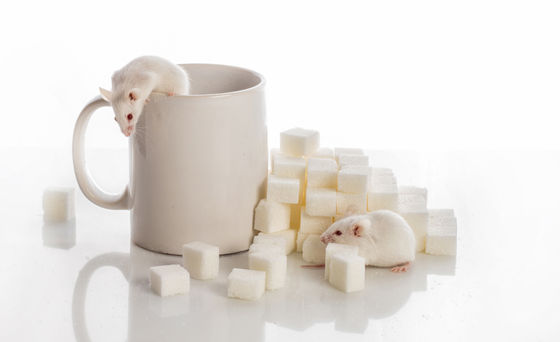Research results that it is 'intestine rather than tongue' that makes you choose a diet full of fat

Even if you are careful about your diet and health, there are probably many people who reach for sweets with plenty of butter and rich fried foods. A study in mice whose tongues were unable to detect fat found that cravings for fatty foods stemmed from the connection between the gut and the brain.
Gut–brain circuits for fat preference | Nature
Cravings for Fatty Foods Traced to Gut-Brain Connection | Columbia | Zuckerman Institute
https://zuckermaninstitute.columbia.edu/cravings-fatty-foods-traced-gut-brain-connection
“We are living in an unprecedented time when excess fat and sugar intake is leading to an epidemic of obesity and metabolic disorders,” said Mengtong Li of Howard Hughes Medical Institute. To find a solution to this problem, Li et al.'s research team conducted a study to find out what drives people to a fatty diet.
In the experiment, the research team prepared water containing fat such as soybean oil and water containing acesulfame potassium , an artificial sweetener that feels sweet on the tongue but does not affect the intestines. I gave it to a mouse.
As a result of this experiment, the mice initially drank sweet water, but after a few days they began to crave water containing fat. Furthermore, when the research team used genetic recombination technology to create mice that did not taste the taste with their tongues and conducted similar experiments, mice that could not feel the taste of fat with their tongues also ate water containing fat. I have come to like it.

``Mice prefer fat not because it tastes like fat, but because the gut that senses fat stimulates the brain to make the mouse choose fat,'' the researchers speculated. We monitored brain activity while feeding fat. They found that neurons in the caudal nucleus solitary region (cNST) of the brain stem were activated in response to fat. The cNST is 'particularly interesting' because it was a region known to influence carbohydrate preferences in another previous study by the Howard Hughes Medical Institute, the researchers said.
In addition, the research team found that there is a nerve in the
According to Mr. Li, one of the two types of cells was a group of cells that functioned as a comprehensive sensor of nutrients essential for life, such as sugar and amino acids, as well as fat. And the other responds only to fat, helping the brain distinguish between fat and non-fat.
The research team said that when drugs were used to block the function of these cells, signals were no longer sent to the vagus nerve even if fat was ingested. In addition, when vagus nerves and cNST neurons that respond to fat in mice were inactivated by genetic recombination, both mice lost their appetite for fat.

'Our tongue tells our brain what flavors we like, whether it 's sweet, salty or fatty ,' said study co-author Charles Zukor. 'It's the gut that tells the brain what it needs.'
In addition, the research team said in the paper, ``Discovery of the mechanism that causes foods rich in sugar and fat may improve dietary habits that lead to cravings for foods rich in sugar and fat, and lead to diseases including obesity, diabetes, and cardiovascular disease. It will lead to an important strategy that will help to combat the disease, ”he said, positioning this discovery as contributing to the discovery of methods to reduce lifestyle-related diseases, which are becoming a global issue.
Related Posts:







